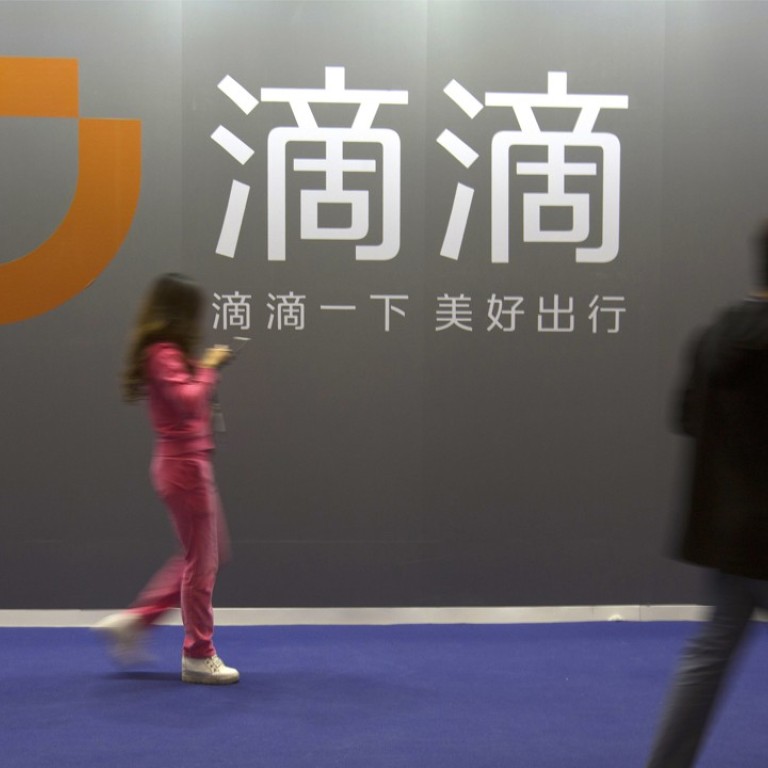
Tesla challenger CHJ Auto teams up with Didi to build ride-sharing cars
CHJ Auto, founded by internet entrepreneur Li Xiang, abandons its plans for an ultra-compact car to build vehicles with Didi Chuxing, the market leader in China’s ride-hailing market
What will a purpose-built car for ride-pooling look like?
Roomier interiors so strangers do not invade each other’s space, long battery range to cut down on recharging, and self-driving technology in the future.
CHJ Auto, the Beijing-based electric-start-up founded by internet entrepreneur Li Xiang, has teamed up with Didi Chuxing, the market leader in China’s on-demand transportation market, to develop what would probably be the first car designed specifically for ride-pooling.
“The goal of our cooperation is to bring down trip costs, the lower the better,” Li, who before CHJ had built Autohome Inc. into China’s biggest automotive web portal, told reporters on the sidelines of the Newtop 100 CEO Summit 2018 in Beijing on Saturday. “In just two years, Chinese ride-sharers will see a significant step-up in services”
CHJ is among the electric car start-ups that have sprouted up in recent years after the Chinese government started handing out special manufacturing permits to non-traditional carmakers with the aim of injecting innovation and competition. These tech-savvy start-ups are chasing a vision of clean, connected and self-driving vehicles, inspired by how billionaire Elon Musk had succeeded with Tesla Motors to upend the traditional auto industry,
With the Didi tie-up, CHJ will scrap an original plan to develop a low-priced ultra-compact electric car with swappable battery packs aimed at those upgrading from electric bicycles. It will still go ahead with a luxury seven-seater SUV targeting mid- to high-end users, with deliveries slated for next year.
This can be seen as a move by CHJ to hedge its bets, and a bet on the direction of the mobility market in China. Ride-hailing has changed the concept of car ownership in the world’s biggest auto market, especially among the young, for whom traffic jams are endemic and where prospective buyers can wait for years to land a license plate in a major city like Beijing.
At the lower end of the market, many motorists could give up driving for shared rides, especially if vehicles become more automated, freeing them up to do everything from catching a few more winks to playing games on their smartphones.
The numbers bear this out: ride-hailing orders have increased to almost 30 million a day in a market dominated by Didi, which elbowed Uber out of China after an expensive subsidy war. Li thinks the market could grow another tenfold by 2030, with manned buses replaced by self-driving ones and ride-sharing accounting for half of all commutes.
“The post-90s generation in China is less enthused by the idea of owning a car, as it’s more difficult for them to locate a car plate or parking place in big cities,” Li said. “Roads have been jammed as long as they can remember.”
At the other end of the auto market, though, most industry insiders expect demand for sports cars and luxury cars to remain more insulated from sharing and autonomous driving.
Founded in 2015, CHJ closed its B round of fundraising last month, raising 3 billion yuan (US$478 million) from a group of investors led by Matrix Partner China and Shouting Fund. Total amount of financing has reached 5.75 billion yuan and is expected to surpass 10 billion yuan by the year end, according to Li. CHJ has two manufacturing facilities in Changzhou, Jiangsu province, and an annual production capacity of 80 million battery cells.
Even with the backing, Li is conscious that CHJ has to get it right the first time round.
“After betting billions or tens of billions yuan, you get to play one hand, and one hand only,” he said. You won’t have a second chance if customers are unhappy with your products”.

